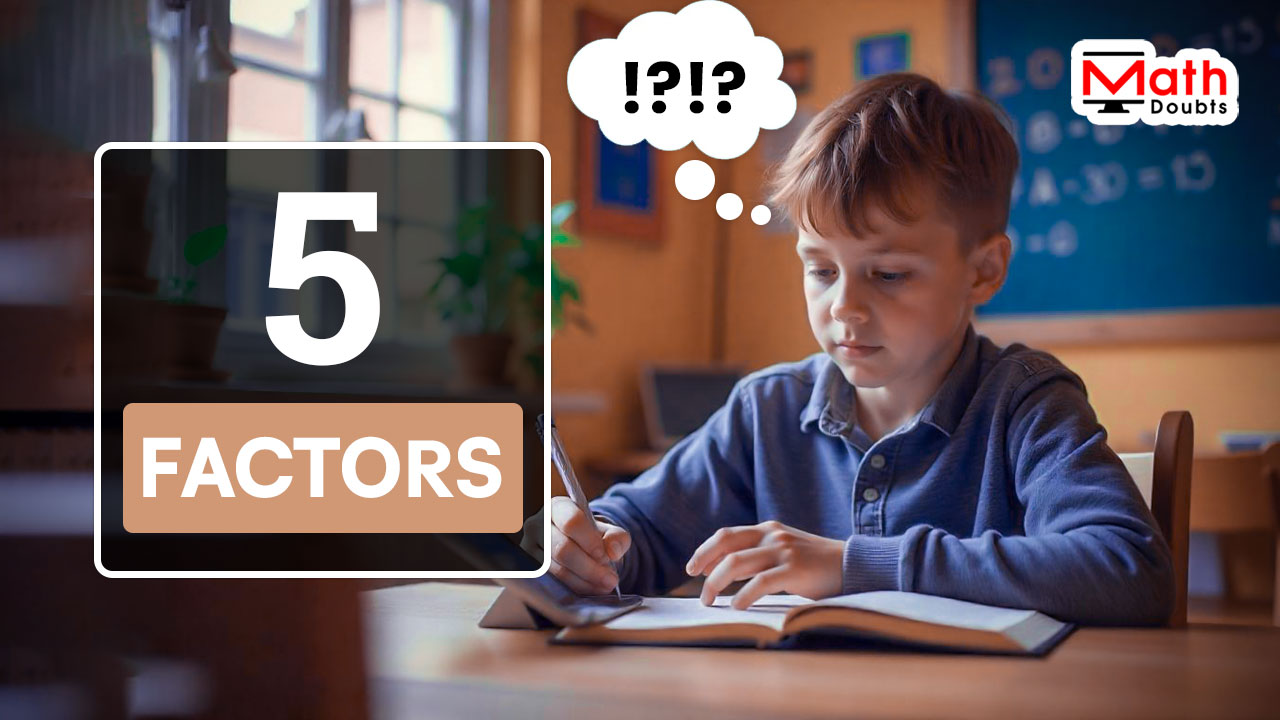Factors of 5
Factors
$1$ and $5$ are the factors of $5$.
The number five is a natural number and also a whole number. Mathematically, it represents a whole quantity. In some cases, the number $5$ should have to be expressed in its factors. So, every one of us should know what the factors of five are, and how to find the factors of $5$ arithmetically.

According to arithmetic, the factors of $5$ are $1$ and $5$. Now, let’s know why $1$ and $5$ are only factors of five mathematically.
In mathematics, the number $1$ is a first natural number. So, let’s divide the number $5$ by $1$ firstly.
Step: 1
$5 \div 1$
$=\,\,$ $\dfrac{5}{1}$
Divide the number $5$ by $1$ with long division method to find the remainder.
$\require{enclose}
\begin{array}{rll}
5 && \hbox{} \\[-3pt]
1 \enclose{longdiv}{5}\kern-.2ex \\[-3pt]
\underline{-~~~5} && \longrightarrow && \hbox{$1 \times 5 = 5$} \\[-3pt]
\phantom{00} 0 && \longrightarrow && \hbox{No Remainder}
\end{array}$
The remainder is zero when the number $5$ is divided by $1$. It means, there is no remainder and it clears that the number $1$ divides $5$ completely. Therefore, the number one is a factor of five.
Similarly, let’s divide the number $5$ by the natural number $2$.
Step: 2
$5 \div 2$
$=\,\,$ $\dfrac{5}{2}$
Divide the number $5$ by $2$ with long division method to find the remainder.
$\require{enclose}
\begin{array}{rll}
2 && \hbox{} \\[-3pt]
2 \enclose{longdiv}{5}\kern-.2ex \\[-3pt]
\underline{-~~~4} && \longrightarrow && \hbox{$2 \times 2 = 4$} \\[-3pt]
\phantom{00} 1 && \longrightarrow && \hbox{Remainder}
\end{array}$
The remainder is $1$ when the number $5$ is divided by $2$. It means, the number $2$ does not divide $5$ completely. So, the number $2$ is not a factor of $5$.
Now, let’s divide the number $5$ by $3$ and $4$ one after one to find their remainders.
Step: 3
$5 \div 3$ $\,\,\,\longrightarrow\,\,\,$ $\hbox{Remainder is 2}$
$5 \div 4$ $\,\,\,\longrightarrow\,\,\,$ $\hbox{Remainder is 1}$
The remainder is $2$ when the number $5$ is divided by $3$ and the remainder is $1$ when $5$ is divided by $4$. The numbers $3$ and $4$ cannot divide $5$ completely. So, the numbers $3$ and $4$ are not factors of $5$.
Finally, let’s divide the number $5$ by the same number.
Step: 4
$5 \div 5$
$=\,\,$ $\dfrac{5}{5}$
Divide the number $5$ by itself with long division method to find the remainder.
$\require{enclose}
\begin{array}{rll}
1 && \hbox{} \\[-3pt]
5 \enclose{longdiv}{5}\kern-.2ex \\[-3pt]
\underline{-~~~5} && \longrightarrow && \hbox{$5 \times 1 = 5$} \\[-3pt]
\phantom{00} 0 && \longrightarrow && \hbox{No Remainder}
\end{array}$
The remainder is zero when the number $5$ is divided by itself, and it means the number $5$ divides itself completely. So, the number $5$ is a factor of itself.
The natural numbers after $5$ are $6, 7, 8$ and so on. They cannot divide the number $5$ completely. So, the procedure of finding the factors $5$ should be stopped.
Conclusion
Mathematically, it is proved that the numbers $1$ and $5$ divide the number $5$ completely. So, the numbers $1$ and $5$ are the factors of $5$.
Factorization
The factors of $5$ are $1$ and $5$. So, the number $5$ can be expressed in its factors $1$ and $5$ as follows.
$5 \,=\, 1 \times 5$
Representation
The factors of $5$ is written mathematically as follows.
$F_{5} \,=\, \{1, 5\}$
